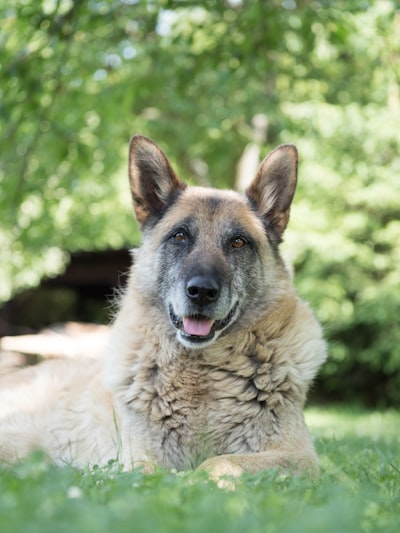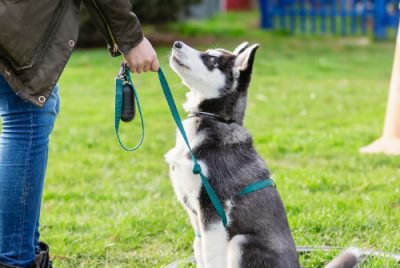Can Older Dogs Get Dementia? Everything You Need to Know
Post Disclaimer
We may earn a commission for purchases made using our links. Please see our Disclaimer to learn more.
Can older dogs really get dementia?
Indeed, older dogs can experience dementia, which is commonly referred to as canine dysfunction (CCD). Signs may involve confusion shifts in sleep routines, lapses in house training, and modified behaviors towards family members. If you observe these indications in your aging dog, seek advice from a vet.
Key Highlights
- Cognitive dysfunction, also known as canine dementia, is a condition that affects older dogs and can impact their quality of life.
- Dementia in dogs includes disorientation, changes in sleep patterns, house soiling, and physical symptoms like restlessness and wandering.
- Treatment options for managing dementia in dogs include medications, supplements, and lifestyle changes such as exercise and mental stimulation.
- Diagnosing in dogs involves a thorough evaluation by a veterinarian, including a medical history and physical exams.
- Creating a safe and comfortable environment for a dog with dementia is important for their well-being and quality of life.
- Preventative measures against canine dementia include a healthy diet, regular exercise, mental stimulation, and socialization.
Introduction
As dogs age, monitoring their health is crucial. While physical decline is common, cognitive decline can also occur, leading to canine dementia, also known as Alzheimer’s disease. Recognizing the signs, such as symptoms, of canine dementia and seeking veterinary care early can improve a dog’s quality of life. This blog delves into the causes, symptoms, diagnosis, treatment, prevention, and emotional impact of canine dementia on dog owners in their senior years. Understanding these aspects helps in effectively supporting aging dogs.
Understanding Dementia in Older Dogs
Dementia is also called dysfunction syndrome (CDS). Canine cognitive dysfunction is a condition that impacts older dogs much like it does humans. As dogs age, their cognitive functions may diminish, resulting in alterations in behavioral and overall mental capabilities. Senior dogs, commonly known as dogs, are more susceptible to developing dementia, which can sometimes be mistaken for ailments like arthritis. Pet owners must recognize the signs and symptoms of dementia in their companions, which closely resemble those seen in human dementia cases. Being attentive to changes is crucial for providing care and support to aging dogs.
Defining Canine Cognitive Dysfunction (CCD)
Canine cognitive dysfunction (CCD) is a condition seen in older dogs, similar to Alzheimer’s in humans. It leads to changes in behavior and cognitive abilities like memory loss and disorientation. The cause is linked to aging and brain changes. Recognizing signs early and seeking veterinary care is crucial for providing appropriate treatment and support and helping improve your dog’s quality of life with their family members. Understanding the signs and seeking medical attention is the most important thing to do when dealing with possible CCD in your beloved pet.
The Causes Behind Dementia in Dogs
The reasons for dog dementia aren’t fully known. Natural aging and health issues like kidney disease can contribute. Changes in brain function, like low dopamine levels and plaque buildup, may also play a part. Dog owners should be mindful of these risks and support their aging dogs’ brain health.
Early Signs and Symptoms of Dementia in Dogs
Identifying the signs and symptoms of decline in dogs is essential to intervene and manage it effectively. While these signs can vary among dogs, some shifts might signal the onset of cognitive issues. Some early indications include confusion, alterations in sleeping patterns, accidents inside the house, and physical manifestations like agitation and aimless wandering. Reduced activity levels and a diminished interest in surroundings are flags for canine decline. These changes may also manifest as loss of appetite, restlessness, and separation anxiety. Pet owners should carefully observe these changes. Consult a veterinarian if they suspect their dog is showing signs of decline. Early detection and appropriate care can enhance the dog’s quality of life. Slow down the progression of the condition.
Behavioral Changes to Watch For
- Disorientation: Dogs with dementia may appear confused, get stuck in corners, wander aimlessly, or walk towards doors on the wrong side.
- Changes in sleep patterns: Dogs with dementia may experience disruptions in their sleep-wake cycle, leading to increased restlessness and more sleep during the day.
- House soiling: Dogs with dementia may forget their house training and have accidents indoors.
- Changes in social interactions: Dogs with dementia may exhibit changes in their interactions with people and other pets, becoming clingy or aloof.
- Activity level: Dogs with dementia may change their activity levels, becoming more restless or lethargic than usual.
These behavioral changes can be distressing for both dogs and their owners. Monitoring these symptoms and seeking veterinary care for proper diagnosis and treatment is important.
Physical Symptoms That May Indicate Dementia
- Health issues: Dogs with dementia may experience physical symptoms such as weight loss, decreased appetite, and changes in bowel or bladder control.
- Restlessness: Dogs with dementia may exhibit restlessness, pacing, or constant movement.
- Wandering: Dogs with dementia may wander, get lost, or enter unfamiliar territory.
- Changes in gait: Dogs with dementia may have difficulty with coordination, appear unsteady on their feet, or have a head tilt.
- Changes in senses: Dogs with dementia may experience changes in hearing or vision, which can lead to disorientation or confusion.
These physical symptoms can indicate the presence of dementia in dogs and should be evaluated by a veterinarian for proper diagnosis and treatment.
Diagnosing Dementia in Dogs
Diagnosing memory loss in dogs is hard because there’s no specific test. A vet, especially one who knows about animal behavior, can check the dog’s symptoms and actions to diagnose cognitive issues. They usually rely on past medical info and physical checks and exclude other possible reasons for the symptoms. Sometimes, more tests like blood work or MRI scans are needed to rule out other illnesses and give a precise diagnosis. Dog owners should collaborate with their vet to ensure their old dog gets the right evaluation and care.
How Veterinarians Identify Canine Cognitive Dysfunction
Veterinarians check medical history, do physical exams, and observe behavior to identify CCD in dogs. They ask about behavior changes, sleep patterns, and other symptoms from dog owners. A thorough exam is done to rule out underlying health problems. Sometimes, more tests like blood work are needed for overall health assessment. MRI scans may be used to assess the dog’s brain. These tools help diagnose CCD accurately and plan treatment for a better life quality for the dog.
The Role of Medical History and Physical Exams
The vet uses medical history and exams to diagnose dog dementia. They ask about past health issues, which helps spot dementia risks. In the exam, the vet checks the body and brain function. They look at gait, reflexes, and thinking skills. The vet then diagnoses dementia based on this information and suggests treatments.
Treatment Options for Managing Dementia in Dogs
While there’s no cure for dog dementia, treatments like meds, supplements, and lifestyle changes can help. Meds like selegiline and propentofylline reduce symptoms. Omega-3, SAMe, and antioxidants can boost brain health. Providing mental and physical activities and a safe environment are vital. Collaboration with a vet is crucial for creating an effective plan for an elderly dog.
Medications and Supplements
Medications and vitamins help manage dog dementia. Drugs like selegiline and propentofylline ease symptoms and slow disease progression. They regulate brain chemicals and boost brain blood flow. Omega-3, vitamin E, and nutrients aid brain health and function by acting as antioxidants and providing necessary nutrition. Alternative therapies such as acupuncture and Chinese herbs can also be beneficial in treating dog dementia. Dog owners should consult vets before giving drugs, supplements, or alternative treatments to ensure proper dosage and treatment length.
Lifestyle Changes to Support Your Dog
In addition to medications and supplements, lifestyle changes help dogs with memory issues. Exercise is vital for health. It boosts the brain and cognition. A good diet supports brain health and well-being. Toys and games keep the mind sharp. Quality time, care, and love boost happiness. A calm, cozy space is essential. These changes aid old dogs’ memory and enhance their quality of life.
Living with a Dog Experiencing Dementia
Living with an old dog with memory problems can be hard for owners. Focusing on the dog’s happiness and giving good care to keep them healthy is vital. This means setting up a safe and cozy space for the dog and sticking to familiar routines. Playing and exercising the dog can keep them active and engaged mentally. Watch the dog’s actions closely and adjust care as needed. As the sickness worsens, changes may be necessary to help the dog better. By being caring and patient, owners can support their elderly dogs through memory problems and ensure they have a good life.
Creating a Safe and Comfortable Environment
Creating a safe place is crucial for dogs with memory issues. Remove dangers and confusion triggers. A well-lit space with clear paths and familiar items is beneficial. Comfy bedding and rest spots are reassuring. Stick to a routine to avoid upsetting changes. Reduce noise for a calm atmosphere. Regularly check the dog’s needs and adjust their space for safety and happiness. A secure environment can enhance the lives of dogs with memory problems significantly.
Training and Behavior Modification Techniques
Training and teaching methods can benefit dogs with memory loss. These methods help handle specific behaviors and boost thinking. Simple exercises like basic commands or games can stimulate the brain and enhance thinking skills. Techniques like rewards and redirection aid in managing symptoms like restlessness and can also be used as special treats for older dogs. Patience and consistency are crucial for teaching dogs with memory loss. By using these methods daily, dog owners can aid their aging pets’ thinking skills and well-being.
Preventative Measures Against Canine Dementia
It’s impossible to stop doggy forgetfulness completely, but some steps can help their brain stay sharp. A good diet with omega-3 fatty acids, antioxidants, and nutrients is key for brain health. Keeping them active with regular exercise is crucial for their cognitive well-being. Mental challenges like puzzle toys and games can keep their minds alert. Socializing with other dogs and people also aids cognitive health. By including these steps daily, owners can aid their aging dog’s brain and lower dementia risk. These preventative measures, such as incorporating fatty acids into their diet, can help maintain cognitive function and improve the quality of life for older dogs.
Diet and Exercise: Keys to Brain Health
A good diet and exercise keep dog brains healthy. Nutritious food with antioxidants, omega-3 fatty acids, and medium-chain triglycerides helps. Exercise boosts blood flow, new brain cells, and cognitive function. Vets can suggest the right diet and exercise based on age, breed, and health. Owners can aid aging dogs’ brain health by focusing on routine matters such as their dog’s diet and exercise.
Mental Stimulation and Socialization
Mental games and being around other dogs and people are good for a dog’s brain. Toys that make them think, games, and training can keep their mind active. Also, playing with other dogs and people is good for their brains. Going on walks, playing, and going to dog events can help. Choosing activities based on the dog’s needs, age, breed, and health is important. By adding these activities to a dog’s day, owners can help their older dogs stay sharp and healthy and have a fun time next time.
The Emotional Impact on Owners
Taking care of a dog with dementia can be emotionally challenging. It’s tough to witness your companions decline. Dog owners should remember that they have a support system and are not alone in this journey. Seeking help from family, friends, or support groups can provide the guidance and comfort needed during this trying period. Deciding on euthanasia for your dog should be based on their quality of life and the symptoms of dementia they are experiencing. It is essential to prioritize self-care and seek assistance to navigate the difficulties of caregiving while ensuring the care of your aging canine friend.
Coping with the Challenges of Caregiving
Caring for a dog with memory loss can be tough. Caregivers must accept the challenges and find ways to cope. They can get help from loved ones, friends, or support groups familiar with this situation. It’s crucial to rest, take care of themselves, and handle stress in caregiving. Being patient and adaptable is key since the dog’s needs may shift. Seeking help and using coping methods ensure good care for elderly dogs while looking after themselves well.
Finding Support and Resources
Caring for a dog with dementia involves utilizing support networks and resources. Consulting with a behaviorist or a vet experienced in dog problems can give you helpful tips on handling your pet’s condition. Engaging with forums or local groups for dog owners facing difficulties can offer emotional encouragement and practical suggestions. Moreover, exploring options like supplements or specialized care facilities for dogs dealing with cognitive challenges can improve the well-being of your furry friend. Remember, you’re not alone in this journey; seeking help and support is essential for you and your cherished canine companion.
Conclusion
Elderly dogs experiencing dementia require compassion and empathy. Canine Cognitive Dysfunction (CCD) can impact their behavior and overall health. Detecting it early is crucial. Treatment options such as medications, supplements, and lifestyle adjustments can help alleviate CCD symptoms. Creating an engaging environment and exercise can enhance your dog’s quality of life. As a parent, I provide unwavering support. Consult professionals when needed. Your understanding and affection play a role in assisting your companion through this challenging phase.
Frequently Asked Questions
How can I tell if my dog has dementia or is just aging?
The signs of dog dementia can sometimes be similar to the natural aging process. However, if your dog is exhibiting significant behavioral changes, such as disorientation, changes in sleep patterns, house soiling, and restlessness, it may be indicative of dementia rather than just aging. Consult with a veterinarian for a proper diagnosis.
Are certain breeds more prone to dementia?
While any dog can develop dementia, certain breeds may be more prone to the condition. Small and toy breeds, such as Pugs, Dachshunds, and Chihuahuas, may be at a higher risk due to genetic predisposition and other risk factors. However, dementia can affect dogs of any breed and size.






